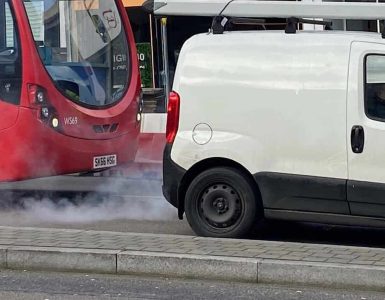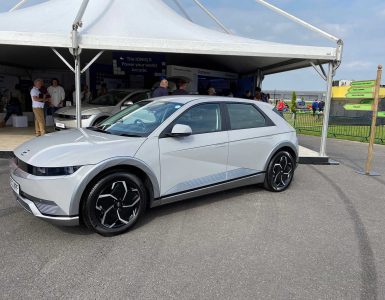There still seems to a little confusion about what a pollutant is so here’s a quick guide. Cars with conventional engines produce some gases that make the air toxic to breathe and some that are not toxic but are bad for global warming.
Pollutants (These make the air toxic to breathe)
Oxides of nitrogen (NOx) is the term usually used to refer to nitrogen monoxide (nitric oxide or NO; a colourless and odourless gas) and nitrogen dioxide (NO2; a red-brown gas with a pungent smell which is soluble in water). Nitrogen monoxide reacts with oxygen or ozone in the air to produce nitrogen dioxide. Oxides of nitrogen occur both naturally as well as being produced by man’s activities – Source Scottish Environment Agency SEPA
As you can see it is the high levels of NO2 that makes diesels stink like the deck of a cross channel ferry when they idle or drive past.
While some of this comes from other sources diesel vehicles do far more harm because they deliver this toxic gas from the exhaust directly into the lungs of anyone in the street near the car – from cyclists to pedestrians to the people in the car behind. A modern new Euro 6 diesel produces 7X as much NO2 as petrol cars on average. Scale that up and 1,000 diesels produce as much 7,000 petrol cars! A few diesels are clean (around 10%) but equally some are dirtier and are as polluting as 25 petrol cars.
PM 10 and PM2.5
These “particulates” are responsible for about 60% of early deaths from air pollution in cities. Essentially dust, the PM 10 gets into our lungs while PM 2.5’s are so small we breathe them in and absorb them into the bloodstream. They even end up in unborn children when they re mothers breathe polluted air. Because the dust is composed of burnt an unburnt particles of diesel or petrol exhaust they can be carcinogenic when inhaled.
Carbon monoxide (CO)
This poisonous gas is formed by incomplete combustion of the fuel in car engines. It is produced in much higher quantities in petrol cars than by diesel cars. It can have major (or even fatal) effects when concentrated in a confined space such as a car engine running in a garage. It has been reduced by using the catalytic converters that have been mandatory on petrol cars for over a decade.
Greenhouse Gases
CO2 (Carbon dioxide)
This is of concern because human activity is raising the amount of CO2, a greenhouse gas, in the atmosphere. There is a consensus that unless we reduce CO2 the planet will warm by enough to cause climate change, melting of icecaps and rising sea levels over the coming decades.
CO2 is not harmful to breathe and is converted by trees and plants into oxygen but human activity is producing too much CO2 and cutting down forests that could help reduce it.





